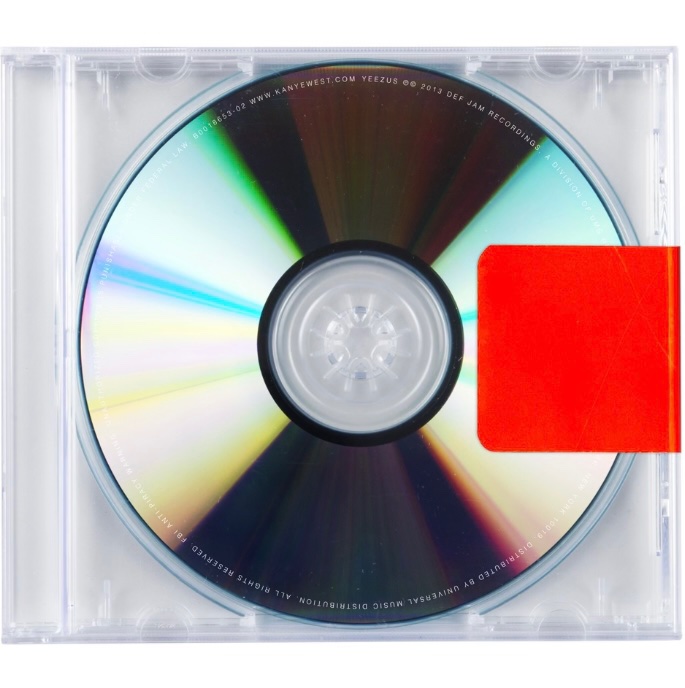
Screenshot by Anna Hochman
Over the last twelve months, Kanye West has dominated headlines across the world for seemingly every reason except what made him famous: his music. The New York Times examined his presidential aspirations in an article titled Kanye West’s Perplexing Run as a Potential 2020 Spoiler, while months later TMZ broke the bombshell news that his wife of seven years, Kim Kardashian, was filing for divorce. Combine those headlines with a 2020 Twitter video of West urinating on his Grammy award and the noise swirling around West’s personal life becomes deafening.
Examining West’s extensive discography that now spans eleven albums, it is clear that no album accurately represents this abject polarization more than his 2013 offering, “Yeezus.” However, when sonically engrossed in “Yeezus,” listeners can not only unveil but also understand the emotional impetus that has driven his brash actions and their corresponding headlines.
With a run time of 40 minutes that spans 10 songs, “Yeezus” is a concise experimental album where West brashly asserts himself as a creative, egomaniac mastermind who is disrupting the entire hip-hop industry. His self-lionization is illustrated immediately through the title, a haphazard amalgamation of his nickname, Ye, and Jesus Christ.
In “On Sight,” the opening track, West assaults listeners’ ears, forcing them to endure a thirty-five-second intro produced by EDM duo Daft Punk, before uttering his first bars: “Yeezy season approaching, f*** whatever y’all been hearing.” These lyrics, paired with some of Kanye’s most adventurous production to date, make it clear that “Yeezus” is a dynamic force unlike anything that hip-hop fans have heard before.
“On Sight” makes way for “Black Skinhead,” one of two singles off the album and arguably the most popular song from the album. Containing what has become one of the most recognizable drum sequences of modern hip-hop, “Black Skinhead” is West at his very best, with dynamic production and introspective yet forceful lyrics that critically examine his position as a Black man in the music industry.
The third track “I Am A God” is largely forgettable, with subpar lyrics and a beat that awkwardly sits in the gray zone between minimalistic and experimental. However, West’s assertion that he is a god (hurry up with his damn massage!) only furthers the ego-fueled rampage presented during the first two tracks.
“New Slaves” is the album’s fourth track and is a clear standout. Rapping over a beat that contains lively synths among other various bouncy 808s, Kanye proceeds to assail everything in sight, from segregation in the United States, materialism and the systemic racism of music industry executives to rich white women from the Hamptons. West ultimately agrees that the song is a force, boldly claiming in a 2013 tweet shortly after the album release that the second verse of the track is the best verse in hip-hop history.
The follow up to “New Slaves,” “Hold my Liquor,” sits almost in direct contrast to the brash emotions of the prior song, as West introspectively examines his fight for control over his inner persona. Aided by an emotional chorus performed by fellow Chicago MC Chief Keef, West delicately examines the bounds of what he is truly capable of as well as the struggles of his prior relationships.
However, West seems to shy away from this newfound emotional clarity as he transitions into track six: “I’m In It.” With lyrics that would have a casual hip-hop listener frantically looking for the skip button, “I’m In It” can only be described as a gratuitous four-minute-long ode to sex. Setting sexually provocative lyrics aside, however, “I’m In It’s” true appeal is in its incredible production. From creating a new Jamaican drill subgenre to masterfully sculpting the peaks and valleys with punchy 808s and jarring synths, West continues to push the boundaries of production by forming a unique track that continuously demands the listener’s full attention.
West is able to move away from his brief emotional diversion with the next track, “Blood on the Leaves.” The beat is structured around a sample of the American singer Nina Simone’s 1968 song, “Strange Fruit,” an extended metaphor about the lynching of African-Americans in the South. Falling back on his auto-tune style prevalent in “808s & Heartbreaks,” West bemoans the failure of his romantic relationships (“we could’ve been somebody”) over a dramatic fanfare of horns as he masterfully creates a modern hip-hop love ballad.
The following track, “Guilt Trip,” furthers the theme of West’s romantic struggles, but also has him reflecting on some of the reasons things went awry. Was it because of the trips to Rio? Was it because she’s into Leos? His emotional growth is shown over the two consecutive tracks, as West not only identifies the problem but also seeks to examine his own shortcomings. With the Jamaican singer Popcaan adding a catchy hook and frequent collaborator Kid Cudi lending some of his trademark emotional crooning on the outro, “Guilt Trip” is one of the best songs on “Yeezus,” a sentiment that its low streaming numbers do not necessarily reflect. Sitting at only 29 million streams, the song is dwarfed in popularity by the more popular tracks like “Black Skinhead” and “Blood on the Leaves,” which sit at 375 and 126 million streams, respectively.
The ninth track, “Send It Up,” is a braggadocious toast to partying and fame set over a wildly experimental beat filled with oscillating synths that sound like a car slamming on the brakes. While the song definitely grows on the audience after each listen, fans of a more lyrical style of hip-hop would probably turn it off after hearing Kanye rhyme “in the club” with “in the club” four consecutive times.
Kanye concludes “Yeezus” with “Bound 2,” which is easily the most approachable song on the album. On “Bound 2,” Kanye reverts back to the formula that propelled him to superstardom, rapping over a unique soul sample on a simple beat. It’s a stark contrast from the aggressive and jarring feel of the nine tracks that precede it. Normally, the critique on “Bound 2” would be that it does not sonically mesh with the album but the track’s dynamic impact stems from that exact juxtaposition. The song can be best described as a thank you note — West seemingly rewards listeners for sticking with his new jarring sound to the very end by reassuring them that he is still capable of making his quintessential hits.
It’s evident why “Yeezus” is West’s least commercially popular hip-hop album. The songs lack catchy elements and possess diminished replay value while the beats are unlike anything he’s pursued artistically before. The lyricism in this project also takes a dramatic step back from his other previous projects, leading to many uninspired bland verses at times. However, the album is filled with many incredible bright spots as well. West succeeds at redefining his own sound with songs like “Guilt Trip” and “Blood on the Leaves” and also still presents dynamic lyricism on “Black Skinhead” and “New Slaves.” It’s one of the best examples of an experimental album that has still solidly maintained its place in the artist’s discography over time. At the end of the day, “Yeezus” does not necessarily have to be every Kanye fan’s favorite album, but it certainly deserves their respect and a full listen.






